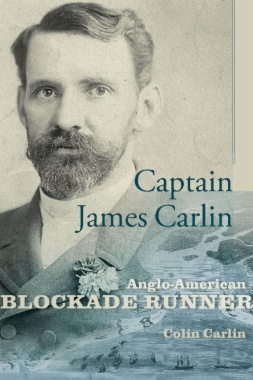A portrait of one of the most successful blockade runners who brought vital supplies to Confederate forces
Captain James Carlin is a biography of a shadowy nineteenth-century British Confederate, James Carlin (1833-1921), who was among the most successful captains running the U.S. Navy's blockade of Southern ports during the Civil War. Written by his descendent Colin Carlin, Captain James Carlin ventures behind the scenes of this perilous trade that transported vital supplies to the Confederate forces.
An Englishman trained in the British merchant marine, Carlin was recruited into the U.S. Coastal and Geodetic Survey Department in 1856, spending four years charting the U.S. Atlantic seaboard. Married and settled in Charleston, South Carolina, he resigned from the survey in 1860 to resume his maritime career. His blockade-running started with early runs into Charleston under sail. These came to a lively conclusion under gunfire off the Stono River mouth. More blockade-running followed until his capture on the SS Memphis. Documents in London reveal the politics of securing Carlin's release from Fort Lafayette.
On his return to Charleston, General P. G. T. Beauregard gave him command of the spar torpedo launch Torch for an attack on the USS New Ironsides. After more successful trips though the blockade, he was appointed superintending captain of the South Carolina Importing and Exporting Company and moved to Scotland to commission six new steam runners.
After the war Carlin returned to the southern states to secure his assets before embarking on a gun-running expedition to the northern coast of Cuba for the Cuban Liberation Junta fighting to free the island from Spanish control and plantation slavery.
In researching his forebear, the author gathered a wealth of private and public records from England, Scotland, Ireland, Greenland, the Bahamas, and the United States. The use of fresh sources from British Foreign Office and U.S. Prize Court documents and surviving business papers make this volume distinctive.
- Cover
- Contents
- List of Illustrations and Maps
- Preface
- Acknowledgments
- Introduction
- Chapter 1 Early Days, 1833–1848
- Chapter 2 Navigation School, the Apprentice, 1850–1856
- Chapter 3: United States Coast Survey, 1856–1860
- Chapter 4 A Romantic Interlude, 1857
- Chapter 5 Transition, 1860
- Chapter 6 The Blockade Is Declared, 1860–1861
- Chapter 7 The Wildcatter, Blockade Running Under Sail, 1861–1862
- Chapter 8 The First Gunfire: The Alert, October 1861
- Chapter 9 The Confederacy Confronts the Blockade: The Business of Blockade-Running, 1861–1862
- Chapter 10 Running through the Blockade for Trenholm and Company, 1861–1862
- Chapter 11 The Memphis Affair, July 31–August 1, 1862
- Chapter 12 The Trial of the Memphis, August–September, 1862
- Chapter 13 Recriminations and Fallout, 1862
- Chapter 14 Fort Lafayette: Anglo-American Diplomatic Exchanges and James Carlin’s Struggle for Release, August–December 1862
- Chapter 15 Still a Captive, Late 1862
- Chapter 16 Diplomatic Power Play, Christmas 1862–January 1863
- Chapter 17 Carlin Stakes His Claim, January–July 1863
- Chapter 18 Resumption of Trade: “The Intrepid Carlin,” January–May 1863
- Chapter 19 The “Commodore” of the I&E Company: “Knights of the Sea,” June–July 1863
- Chapter 20 Charleston Under Siege, 1863
- Chapter 21 The CSS Torch Incident: Drama and Treachery, August 1863
- Chapter 22 Trouble in Bermuda: Or How Not to Run the Blockade, September–November 1863
- Chapter 23 Preparing for Change, December 1863
- Chapter 24 Appointment in Scotland, December 1863–1864
- Chapter 25 Liverpool and the Last Days of the Confederacy, March 1864–June 1865
- Chapter 26 The Last of the Cotton, April–May 1865
- Chapter 27 Financial Matters, 1864–1866
- Chapter 28 Life in England, June 1865–1871
- Chapter 29 Charleston and Florida Ventures, 1865–1869
- Chapter 30 The Steamer Salvador and the Cuban Revolution, 1869
- Chapter 31 The Cuban Run, May 1869
- Chapter 32 The Cuban Shore, May–June, 1869
- Chapter 33 The Queen v. Salvador and British Foreign Enlistment Act 59, Geo. III 1819 c.69., May 1869
- Chapter 34 Caribbean Repercussions: The Governor Tenders His Resignation, 1869–1878
- Chapter 35 What Happened Next, 1870–1891
- Appendix 1 Additional Documents
- Appendix 2 Reflections on Confederate Finance
- Appendix 3 Alexander D. Bache’s Correspondence with James Carlin
- Appendix 4 Bahamian Exports, 1861–1865
- Notes
- Bibliography
- Index
- A
- B
- C
- D
- E
- F
- G
- H
- I
- J
- K
- L
- M
- N
- O
- P
- Q
- R
- S
- T
- U
- V
- W
- Y
- Z

